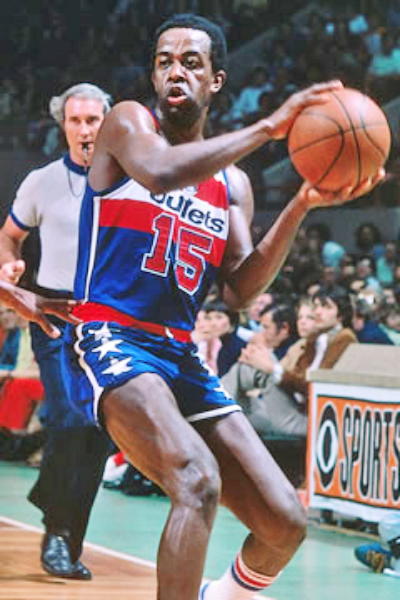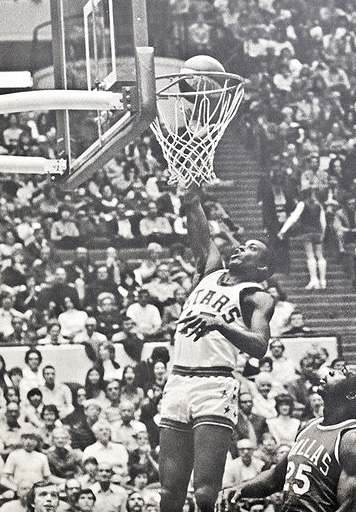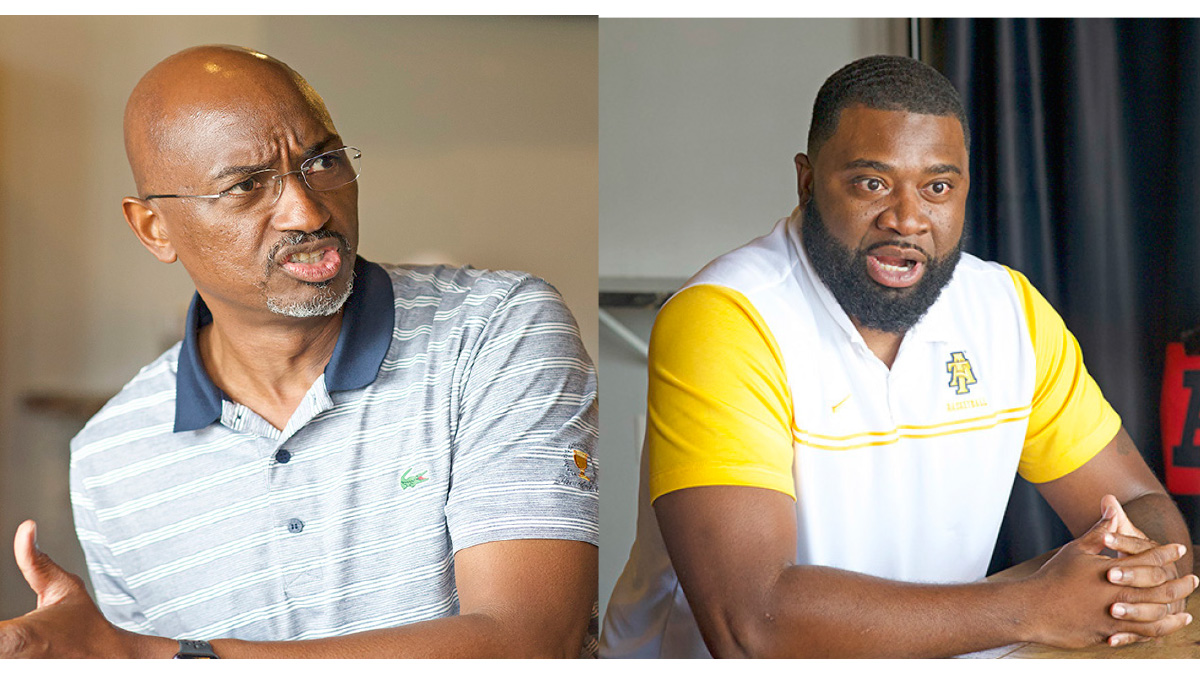NC A&T and UNC-Greensboro — Greensboro, North Carolina’s two NCAA Div. I men’s basketball programs — have a unique HBCU phenomenon taking place this upcoming season.
The two institutions, separated by just over two miles on opposite sides of the Gate City’s downtown section, have quite different histories.
On the hardwood this season however, where both teams recently started practicing, they’ll have much in common.
The Joneses
The Aggies will begin their first year in the Big South Conference under third- year under head coach Will Jones. The Spartans, who compete in the Southern Conference, will begin their first year under head coach Mike Jones. But last names and new beginnings are not the only things the Joneses have in common.
Both Joneses are products of Historically Black Colleges and Universities (HBCUs). Mike attended Howard University from 1983-87, and Will attended South Carolina State University from 2000-04.
Both also played college basketball, as guards, under successful 39-year veteran HBCU coach Cy Alexander, who led the NC A&T program from 2012-16, where he won his sixth MEAC title and NCAA berth. Alexander was also head coach at Tennessee State University from 2003-2010.
The full circle

Alexander left Howard for his first head coaching job at South Carolina State in 1987. He built a championship culture during a successful 16-year-run (1987-2003). The Bulldogs won five Mid- Eastern Athletic Conference tournament titles and earned five NCAA Tournament berths under Alexander. At S.C. State, he recruited and coached Will Jones.
For his first 11 years in coaching (1976-87), Alexander was the single, do-everything assistant at Howard under head coach A. B.Williamson. During their time there, Williamson and Alexander suffered through seven-straight, gut-wrenching tournament championship game losses to NC A& T. They recruited and helped coach Mike Jones at Howard.
Perhaps fittingly, the two coaches and their teams will face off to open the 2021-22 basketball season on Tuesday, Nov. 9 at the Greensboro Coliseum.
An unknown history
An example of how fortuitous it is for these two coaches with similar backgrounds to be in the same city and meeting to open the season is that neither was aware of their common connections, to HBCUs or to Alexander. That alone should make the November season-opener even more intriguing and interesting.

All that came out in August when HBCU Gameday got the three together for a two-hour sit-down luncheon at a local Greensboro restaurant.
Their similar paths to this Market Street rivalry, in a sense, couldn’t be more different.
Will Jones’ journey to NC A&T
Willie “Will” Jones was recruited to S.C. State out of his native Charleston, S.C. after the 1999-2000 season. “They were coming off a tournament championship (under Alexander in 2000) when I came in,” Will said.
Will’s second team at S.C. State was really talented. “We had Moses (Malone Jr., son of Hall of Famer Moses Malone) and (Clemson transfer) Vincent Whitt from Greensboro, among others who could really play. Here I was from little Charleston, South Carolina and I was practicing every day with McDonald’s All-Americans.,” Will Jones said.
“Will could really shoot,” Alexander said. “He might have been a step slow, but he made up for it with his knowledge of the game.”
The Bulldogs won the regular season MEAC title that season but lost to Hampton in the tournament finals. Hampton went on the beat Missouri in the first round of the Big Dance in one of the biggest upsets in NCAA tournament history.
With Jones on the roster, Alexander and the Bulldogs won their fifth MEAC Tournament crown and earned their fifth NCAA Tournament berth the next season. After that 2002-03 season, Alexander left for Tennessee State.
Into the real world
Will Jones got his first job in basketball when he was hired by Alexander as a grad assistant at Tennessee State.
“I turned down a job at Sears & Roebuck making $55,000 a year to become a grad assistant at Tennessee State making $600 a month,” Will Jones said. “They had called me mini-Cy since I was in school (at SCSU) so I thought it was a great opportunity.”
Later, Alexander recommended Will for an assistant’s job at LeMoyne Owen College in Memphis, where he worked for legendary coach, David “Smokey” Gaines who passed in 2020. He had short stints as an assistant at his alma mater, SC State, before moving on to NW Florida State Junior College, Georgia, Jacksonville and Florida A&M.
Will Jones lands on Market Street

Will Jones, 44, got to Greensboro before Mike Jones. He was brought in to NC A&T as an assistant by Jay Joyner, who also played at SC State for Alexander from 1993 to to 1996 and was Alexander’s assistant at Tennessee State from 2003 to 2005. Joyner was Alexander’s top assistant at NC A& T who took over the Aggies program when Alexander stepped down midway through the 2016 season.
Joyner was suspended early in the 2019-20 season, with Will taking over as interim head coach in December. After posting a 14-5 record, 12-4 in the MEAC to finish in second place, Jones was named MEAC Coach of the Year. The COVID-19 pandemic shut down the 2020 MEAC tournament after just one round and halted just about every other post-season tournament.
Will was elevated to head coach in June 2020.
In the pandemic-shortened 2021 season, his team finished first in the MEAC’s Southern Division with a 7-1 conference record. His Aggies, however, were disqualified from participating in their final MEAC Tournament after a false positive test from a member of his staff.
2021 will be NC A&T’s first year in the Big South Conference.
Mike Jones’ journey begins
Mike, a Washington, D. C. native, is the son of Jimmy Jones, a talented 6-4 guard out of Grambling University who was a six-time all-star in the ABA before finishing his career in three years with the NBA’s Baltimore Bullets. (now Washington Wizards).
Jimmy Jones played on a talented team at Grambling with Basketball Hall of Famer and black college legend, Willis Reed. Jimmy, from Tallulah, Louisiana, was drafted by Baltimore in the second round of the 1967 NBA Draft. It was the same year the Bullets drafted Earl “The Pearl” Monroe out of Winston- Salem State in the first round.
“My dad figured, since the Bullets drafted Monroe in the first round, he needed to go to the ABA,” Mike said. So, Jimmy played in the ABA although the Bullets retained his rights.
The talented Mr. Jones


In addition to his six ABA all-star appearances (1968-71, 1973, 1974), Jimmy Jones was a 3-time all-ABA first teamer, an ABA all-Rookie team member and was selected to the ABA all-Time team. He played with the New Orleans Buccaneers/Memphis Pros (1967-71) and eventually the Utah Stars (1971-74) in the ABA.
Jones stayed with the Bullets from 1974-77.
For his career, Jones averaged 16.3 points per game, 19.2 points during seven years in the ABA. His average of 26.6 points per game in the 1968-69 season was his best. He retired in 1977.
“When he got drafted, I was two,” Mike said. “That was (19)67. When he went to the Bullets in (19)74-75, I was in the eighth grade.”
On to the Mecca
Alexander found Mike Jones playing in a summer league while attending Paint Branch High School in suburban Maryland.
“Mike was very athletic,” Alexander said. “He could run, jump and defend. A lot of that he inherited from his dad. He had it all. And he was highly intelligent,” Alexander said of Jones, who majored in zoology at Howard.
The Bison were 15-14 in Mike Jones’ first year and got more successful each year.
“We knew how to win games,” Jones said. In his senior year, the Bison had the nation’s longest winning streak at 17 consecutive games and finished 24-4.
Alexander said Howard was blessed with a solid quartet of guards — Fred Hill, Jeff Williams, George Hamilton and Jones — that would wear teams down. “None of them played the amount of minutes they wanted to, but all of them had a certain level of ability,” Alexander said. “It was perhaps the best team I was ever associated with.”
Alexander also talked of an incident the two shared while at Howard.
A lesson learned
“We got everybody a summer job at a bakery, factory or something in D. C. and I called and told everybody, ‘whatever you do, don’t be late,’” Alexander explained. “The only person late that day was the (current) head coach at the University of North Carolina at Greensboro,” Alexander said as they all laughed.
“He learned a very valuable lesson that day, because they fired him,” said Alexander, who then asked Mike Jones to correct him if he was wrong.
“And I needed that money,” Mike said. “He was Intelligent and the kind of guy to make you think,” Alexander said.
“I still tell that story to my players,” Mike Jones said.
Alexander said the lesson was that he was never late for anything else.
Mike Jones and NC A&T
Alexander’s six MEAC tournament championships and NCAA berths is only behind late NC A&T legend Don Corbett’s seven tourney titles in league history. Corbett won all seven of his tournament titles in seven straight years, 1982-1988, a streak only equaled in Div. I history by the Kentucky Wildcats. In another interesting twist, all of those championship game wins came at the expense of Howard under Williamson, a NC A&T graduate, and during Alexander’s 11 years on the Bison’s bench. Four came with Mike Jones playing for Howard.
Jones will tell you there were no more excruciating losses than those four straight championship game defeats at the hands of the Aggies. He graciously told that story in Alexander’s 2018 memoir entitled, “Beyond The Backboard: My Unique HBCU Experience in the Shadows of Big-Time College Basketball.” On page 80, Mike Jones talks about the heart-breaking loss in the finals his junior year (1986) and his reaction. Here’s an excerpt:
“I remember, I was determined that this year was going to be different, we were going to win this year, beat A&T, and I was confident that we would…We built a sizable lead heading into the last five minutes but ended up blowing the lead and losing the game. It was devastating to all of us, but particularly to me because I had been so determined to win that year. In the locker room after the game, I famously lost it, crying and screaming uncontrollably and cussed everyone out including the coaches… It hasto go down as one of the all-time greatest locker room rants. I meant that towards some of the coaches, but not Cy.”
Into the coaching fray
Jones began as a high school coach at Sidwell Friends (High) School in his native Washington, DC, before moving on to Howard as an assistant. He was also an assistant at Furman, Richmond and West Virginia, before a six-year stint with his former Howard teammate, Dennis Felton, at Georgia. His final post as an assistant was at VCU from 2009-2011 under Shaka Smart.

Mike Jones, 57, was pegged to lead UNC-G in April after spending ten years putting Radford University on the national basketball map. He compiled a 174-150 record leading the Highlanders who were 1-26 and facing numerous internal issues when he took over in 2011.
Jones was 19-45 his first two seasons, before posting winning seasons in seven of his eight other seasons. Winning more than 20 games in five of those seasons, including two regular season Big South championships and one tournament title and NCAA Tournament berth, he was named Big South Coach of the Year in 2018 and 2020.
UNC-G hired him to replace Wes Miller, who left after a successful ten-year stay to take over at Cincinnati.
Bigger lessons learned
Both Joneses say they learned a lot from Alexander.
“Under Cy at SC State, winning wasn’t an option,” Will said. “We were going to win. He taught me and he taught us how to win games. I know the blueprint.”
Although he was an assistant coach at Howard, Mike said Alexander carried himself like a head coach.
“He did everything from top to bottom,” Mike said. “He was relentless, organized and able to do whatever was necessary. What he did then, based on what we have now available with four or five people in the office doing those duties, he did all by himself.
“He helped us all understand to work at our craft. He always talked to me about practicing at game speed to become a good player. That’s what I tell all my players. Going at game speed at practice is the key to playing well in games.”
Two things Alexander said he won’t remember fondly about the Joneses.
“The fact that Will (at Jacksonville) beat me out for (local Greensboro Dudley High School product) Sam Hunt, and Mike is 2-1 against me as a coach, I hate that,” Alexander said. Hunt is now a member of Will Jones’ staff at NC A&T.
New challenges for both Joneses
So, both Will and Mike Jones are facing new challenges. Mike is at a new school and in a new conference. Will is moving to the Big South, a new conference for Jones and the Aggies, and a league that Mike Jones just left.
“I was ready for a new challenge,” Mike Jones said about his coming to UNC- G. “I wanted to get better as a coach and work at a program that had a lot of success. And who wouldn’t want to come to a city like Greensboro, and a program like UNC-G.”
“It’s really special having these two guys in same town,” Alexander said. “I’m happy for and proud of both of them. I mean that sincerely. But 20 years ago, I could see that these guys would be successful in life. I hope I had some small influence on who they are as young men, fathers, family people and great basketball coaches. I wish they both win the Big South and Southern Conference championships.
“Both NC A&T and UNC-G will benefit,” Alexander concluded, “from having the Jones boys as their basketball coaches.”
A little basketball history
NC A&T is deeply rooted in Historically Black College and University (HBCU) history academically. Athletically, the Aggies had ties to the Central Intercollegiate Athletic Association (CIAA) and nationally to the NAIA from 1934 to 1969. It was then the Aggies transitioned to NCAA Div. I and spent 50 years (1970-2020) in the Mid Eastern Athletic Conference (MEAC). It began play in the Big South Conference this year.
UNC-G, the former North Carolina College for Women, allowed men to enroll in 1964. Its first black (female) students enrolled in 1956. Men’s basketball fielded its first team in 1967 with NCAA Div. III status. It moved to Div. II in 1988 and in 1991 to the Div. I Big South Conference before moving to the Southern Conference where it plays now.
